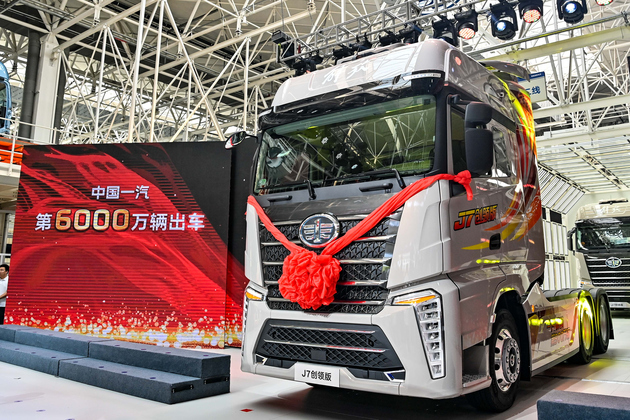Move FM Australian News

China’s oldest truck maker goes global, with an entire industry ecosystem in tow
Oct 22, 2025CHANGCHUN, Oct. 21 (Xinhua) — In the heart of China’s industrial northeast, a manufacturing titan is undergoing a quiet transformation. FAW Jiefang, the commercial truck behemoth that represents the very roots of the country’s automotive industry, is steering its massive operations toward uncharted territories, far beyond the familiar domestic markets that it has long dominated.
The company’s general manager, Yu Changxin, describes this strategic shift with a sense of historic mission. “Jiefang is the foundation of FAW and the origin of new China’s automotive industry,” Yu told Xinhua in an exclusive interview, pointing to the brand’s over-70-year history. “In light of new challenges and objectives, we will accelerate our global expansion, building a second growth curve.”
This goes far beyond simply exporting more trucks. What’s underway is a fundamental shift in how the Chinese industrial giant goes global. Instead of merely shipping products overseas, FAW Jiefang is transplanting its entire industrial ecosystem, partnering with suppliers, dealers, and even financial service providers to build a comprehensive presence in new markets.
The company’s domestic credentials are beyond doubt. In the first half of this year, FAW Jiefang held a 23.2 percent share of China’s medium- and heavy-duty truck market, maintaining its leading position in the industry. Even during July’s traditional sales slowdown, the company achieved a rare double increase, registering growth both month-on-month and year-on-year in sales and market share.
Yet it’s the overseas performance that tells the real story of transformation. International sales of medium- and heavy-duty trucks soared by 58.3 percent year-on-year, driven by notable growth in nine markets, including Saudi Arabia, Vietnam, the Philippines, and Mexico, where sales more than doubled.
A major restructuring paved the way for this expansion. In August 2024, the company formed a dedicated overseas subsidiary — FAW Jiefang Group International Automobile Co., Ltd. — to manage all its international activities. This move provides fresh impetus for the company’s global development, Yu said, noting that it enables a shift from traditional exports to deeply localized operations.
The strategy quickly materialized through a series of moves, beginning with an acquisition of an operational foothold in Africa, followed by the board’s approval for eight new wholly-owned subsidiaries in markets including Uzbekistan, Indonesia, Vietnam, Saudi Arabia and Mexico, with a total investment of nearly 500 million yuan (about 70.5 million U.S. dollars).
Today, FAW Jiefang’s operations span 100 countries and regions, supported by a network of 127 primary dealers, nearly 300 distributors across 44 countries and regions, and 23 assembly plants in 14 countries. Yet this very pace of growth has exposed a critical challenge.
Yu acknowledged that a shortage of international talent has been a key challenge in the company’s global expansion. To address this, FAW Jiefang has adopted a two-track strategy — requiring overseas experience for its next generation of managers while recruiting globally for key positions.
The company is also re-engineering its products from the ground up for global appeal. These “born-global” models are now developed concurrently for domestic and international markets, with features that meet regional needs incorporated into the initial design.
A prime example of this strategy is the J7 4×2 long-haul tractor, released for markets in Mexico, Australia and South Africa. The model was developed via simultaneous engineering in all target markets. It comes standard with advanced safety systems, including an advanced driver assistance system and electronically controlled air suspension, while featuring region-specific options like compliant cab roof lights for Mexico and anti-theft fuel tanks for South Africa.
FAW Jiefang’s most innovative move may be its strategy in markets like Indonesia, where it is taking on established Japanese players. It competes not just with trucks, but with a complete package — in Yu’s words, a “Chinese solution” — that combines vehicle trials, data verification and deep service integration.
The company pioneered “follow-vehicle testing with full-process data recording” in Indonesia. By using hard data to demonstrate advantages in payload, fuel economy and durability, it provided the market with its first-ever systematic comparison of Chinese and foreign truck performance.
It has also built an integrated service network, deploying its own technical experts to key regional service centers. For major projects, dedicated teams provide comprehensive support that includes pre-positioned spare parts, regular equipment inspections and professional driver training, Yu noted.
In Vietnam, the company raised service standards by implementing a 48-hour repair guarantee that slashed average repair times by over 50 percent compared to competitors.
As FAW Jiefang navigates this complex global expansion, Yu maintains a clear philosophy about avoiding the “rat-race-style” competition that plagues the industry.
“The surest path out of it hinges on technological edge and build quality that delivers real value to users,” he said. “We market Jiefang trucks as ‘money-making machines,’ a claim rooted in superior life cycle cost efficiency.”
This focus on long-term value, rather than short-term gains, signals a much larger ambition — to forge a revered domestic brand into a truly global one.


